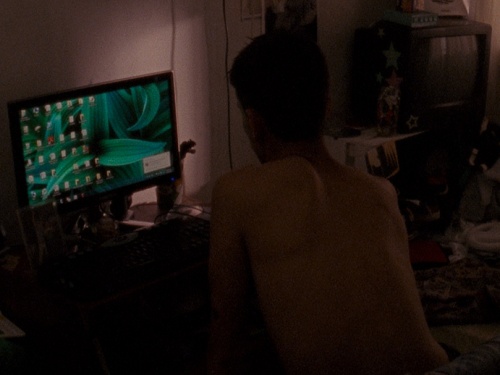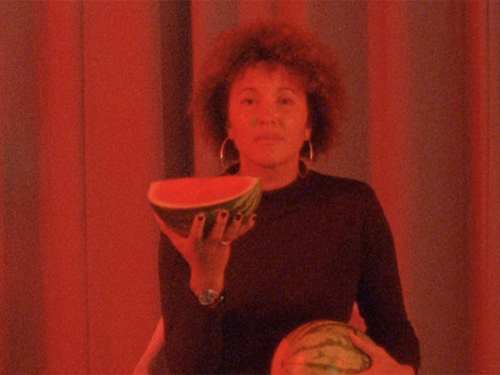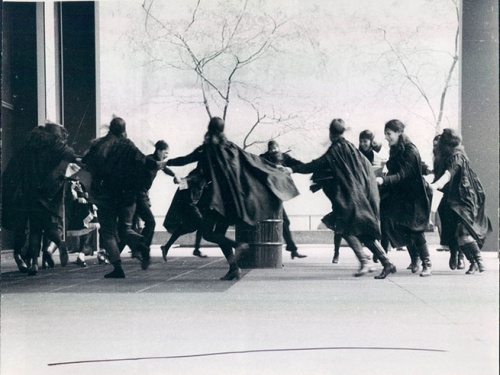A Vivid Cinema: Women in the British Film Industry
Ahead of the opening of Onwards and Outwards, a unique programme of films made by British women filmmakers over the last 50 years, writer, editor and activist Sophie Mayer reflects on the position of women in the British film industry and discusses the significance of the Onwards and Outwards programme in this context.
At the Sarajevo Film Festival this August, European countries agreed to the European Women’s Audiovisual (EWA) network’s declaration, calling for policies to counter the gender imbalance in film. This starts from the premise that "gender equality is an integral part of human rights and a fundamental criterion of democracy,” [PDF] implemented through equal visibility and participation in all spheres of public and private life. Yet, as UN Women Executive Director Phumzile Mlambo-Ngcuka concluded in 2014, noting that little had changed in 20 years since the adoption of the Beijing Platform for Action which called on media to called on media to “avoid stereotypical and degrading depictions of women”, the global film industry “still has a long way to go.”
Onwards and Outwards reflects back on those two decades (and more) of independent British women’s cinema, celebrating the talent, creativity and determination at work in the national industry – how far we’ve come, and how far we could go.
Sally Potter’s Orlando, released in 1993, was part of the Academy Awards’ Year of the Woman, a high watermark in female visibility in mainstream film. Adapted from Virginia Woolf’s novel (dedicated to her lover, the novelist Vita Sackville-West), the film is a portrait of the artist as man, woman and—in Woolf’s words—androgyne. Tilda Swinton’s blazing presence on screen as Orlando, and Potter’s presence behind the camera, add particular weight to the film’s consideration of the barriers hurdled by the female artist – not least one who is also a single mother.
As EWA and UN Women highlight, conditions of production have challenged and delimited filmmakers of vision who deviate from what Grayson Perry has called Default Man – and particularly BAME and LBTQ filmmakers, as panel events with filmmaker Campbell X and curators Club des Femmes and I am Dora will address. At the same time, the impact of digital connectivity, post-9/11 left resistance and the growing, concerted efforts of feminist critics, scholars and programmers has opened a space not only for new female filmmakers to emerge, but also for preserving continuities between generations.
Orlando screens with Where I Am Is Here, Margaret Tait’s exquisite and joyous filmpoem first screened in 1964 (although shot over a decade); they share an investigation into time, place and the non-unitary self. Similarly, Tait’s Place of Work (1976) and Joanna Hogg’s Exhibition (2013) look closely at the artist in her domestic space; and more than that, how the place of work shapes the work and its maker.
Their exploration of how creativity emerges from family and personal histories is also palpable in two imaginative biopics of major British writers, novelist Jeanette Winterson and playwright Andrea Dunbar. Paying homage, Oranges are Not the Only Fruit (Beeban Kidron, 1989) and The Arbor (Clio Barnard, 2010) also ask complex questions about class, family and female sexuality, and about how mothers influence daughters, sharing a darkly comedic, toughly loving streak as a strategy for depicting traumatised lives.
In The Alcohol Years, Carol Morley brings to her own, almost-forgotten experience in 1980s Mancunian clubland the tough love with which Barnard approaches Dunbar’s work and life in 1980s Bradford. It shares with The Arbor an innovative approach to the line between documentary and fiction borne of a roving curiosity, a hunger for the vast, undepicted realms of women’s lives – particularly women on the edge, hungry for experiences of velocity and intensity, who have come to typify the protagonists of the new British women’s cinema.
And no British actor embodies such characters better than Samantha Morton. The programme celebrates two of her key roles, as the titular Morvern Callar (2002) in Lynne Ramsay’s hallucinatory adaptation of Alan Warner’s novel and as a daughter grieving her mother in Carine Adler’s debut Under the Skin (1997). Winning awards internationally—including Best New British Feature at Edinburgh—and offering Morton her breakthrough film role, Under the Skin remains Adler’s only feature thus far.
The surprisingly short filmographies of Sally Potter (seven features), Beeban Kidron (six fiction features and three feature documentaries) and Lynne Ramsay (three features) highlight a pressing concern: how female filmmakers struggle to sustain careers in the face of obstacles not experienced by their male counterparts, including a lack of canonicity which this programme looks to rectify. Onwards and Outwards reaches back to 1942 for Maya Deren’s Meshes of the Afternoon, one of the only films by a female director to be a BFI Film Classic, and lost from sight for many decades before its rediscovery by film feminists in the 1970s. Paired with Morvern, Deren’s dreamlike short highlights a pervasive fascination with finding a film language for female subjectivity.
Andrea Arnold’s Red Road (2006) seats its female protagonist Jackie (Kate Dickie) in front of a bank of CCTV screens, so that her gaze controls the film. Like Orlando’s signature looks to-camera or Morvern’s tripped-out dance scenes, Jackie’s steady gaze and the way in which we see through her perception is both a metaphor for how female filmmakers innovate, and its actualisation. Far from being dead and being female being, as officials in Orlando snigger, "much the same thing," what Onwards and Outwards shows is a vivid cinema, electrified by exploring the unexplored. As the fate of Deren’s work recalls: it’s up to us, as an audience, to keep it alive. ■
Onwards and Outwards, a unique programme of films made by British women filmmakers over the last 50 years, runs 1 – 10 September 2015 at the ICA and until the end of December at nationwide venues.
This article is posted in: Articles, Blog, Events, Film
Tagged with: Onwards and Outwards, Women in Film, Film, Women, Feminism, British Film Industry, Sophie Mayer, Jeanette Winterson, Carol Morley, Joanna Hogg, Margaret Tait, Laura Mulvey, Sally Potter, Club des Femmes, I am Dora, Clio Barnard, Beeban Kidron, Andrea Dunbar, Lynne Ramsay, Carine Adler, Maya Deren, Andrea Arnold









